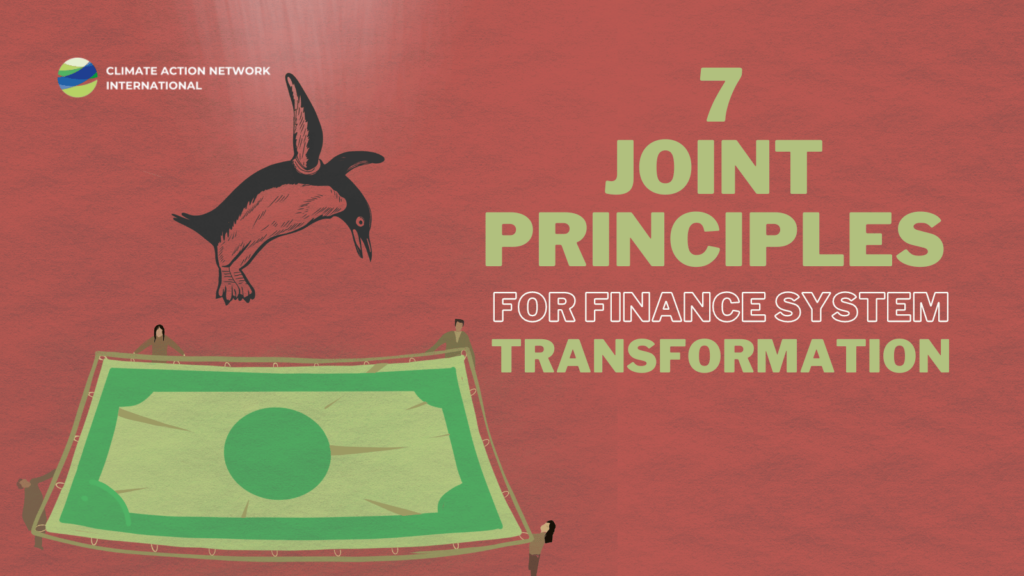Climate Action Network & Partners Launch Joint Principles for Finance System Transformation
14 April 2023

April 2023
Today’s global financial system is failing the people and the planet. Governments, financial institutions, intergovernmental organisations and systems continue to accelerate the climate and biodiversity crises, exacerbate poverty, inequalities and injustices and are unfit to fund the transformations urgently needed. Currently, there is no realistic expectation that climate finance will be delivered at the scale or urgency required by communities on the frontline of this crisis. We cannot continue the business-as-usual approach in global finance and expect to get different results, be it on mitigation, adaptation, loss and damage, or other social injustices. Therefore, it’s time to change the financial system.
It is in a context of failed commitments and an unjust economic system, that the Bridgetown Agenda has emerged as a call for doing things differently. We applaud the wake-up call and the initiative toward alternatives and believe there are elements that the international community must now urgently adopt as a first step. But we urge caution against accepting ‘quick wins’ and ‘half measures’ that come at a cost to longer-term equity and the necessary wholesale transformation of the global financial system for people, nature, and climate.
Instead, we demand higher-income countries step up to ensure the full and equitable transformation of the financial system, rather than expect lower-income countries to accept half measures as they navigate the devastating consequences of climate change and the intersecting poly-crises not of their making. This requires deep system-wide transformations to do financing differently and ensure it is flowing to what is helping not harming. This must be done in addition to fulfilling remaining obligations to provide adequate, predictable, new, and additional needs-based public finance that is not debt-inducing. The governance of climate finance needs to be recalibrated to serve people and communities in the Global South. Debt and unfair fiscal constraints of the financial system critically halt the funding of the necessary transformation.
The financial system is fundamentally distorted against the poor. Despite not having the highest levels of debt, developing countries’ interest rates of low and middle-income countries and the cost of capital in these are multiple times higher than those in higher-income countries – the same is true for the private sector. Data suggests currently developing countries outside China receive only 27% of the necessary flows.
| 1. We need a fairer financial system, reversing the flow of wealth out of developing countries into higher-income countries. |
Currently, lower-income countries record a net finance flow into higher-income countries – an estimated $2 trillion a year going in the wrong direction even with ODA and climate finance included – exacerbating poverty and inequality, and limiting lower-income countries’ opportunities.
| 2. We need to urgently increase truly additional money for developing countries to address the climate crisis alongside other linked crises. |
Higher-income countries must at least deliver the UN target set back in the 1970s (before agreements to provide climate finance) of 0.7% GNI for ODA in addition to a fair share of truly new and additional climate finance (noting the New Collective Quantified Goal and loss and damage fund) without diverting money away from poverty reduction or other crucial purposes.
| 3. We need to urgently and equitably phase out fossil fuel finance which harms people, the climate and biodiversity and instead finance what works for people, nature and climate. |
Guided by climate justice and the fiscal capacity to transition, governments and financial institutions must phase out all fossil fuel finance and massively scale-up investment in renewables and nature, including through direct foreign investment, official development assistance, support from bilateral and multilateral development banks, and export credits.
| 4. We need to dismantle colonial structures of international financial institutions and create rights-based, people-centred, democratic and transparent institutions |
To achieve this, developing countries must play a fair and major role in the governance of international financial institutions and MDBs, participation and transparency of these institutions must reflect today’s world and not the colonial past – public finance should be oriented towards those institutions, especially under the UNFCCC, with governance structures that include equal representation of developing countries, and representation of affected communities, Indigenous Peoples and civil society.
| 5. We need debt justice and debt cancellation |
Urgent cancellation of debts (without economic conditionality) by external creditors, including private lenders and multilateral lenders, for all countries that need it, to reduce debt to a level that allows the SDGs, basic needs and rights to be met, and to create the fiscal space needed to scale up investment in necessary climate action and social services.
| 6. We need tax justice and new finance on a polluter pays basis |
To finance climate action and other social justice goals, governments must tax the fossil fuel industry in line with the Polluter Pays Principle as part of a wider reversal of wealth flows from lower-income countries to higher-income countries as well as significantly increasing taxes on lifestyles, income and wealth of the richest consumers (who are also the biggest polluters).
| 7. We need to ensure all climate finance reaches climate-vulnerable countries and communities |
Climate finance is based on the UNFCCC principle of common but differentiated responsibilities and respective capabilities, with finance flowing from those who have caused the climate crisis to those who have not, to enable them to tackle climate change. Yet to date, barriers to getting finance to those who need it most have not been overcome, particularly for already marginalised and disproportionately impacted people and racialised communities, including Indigenous Peoples, women, children and youth, and people with disabilities.
For enquiries: email media@climatenetwork.org

